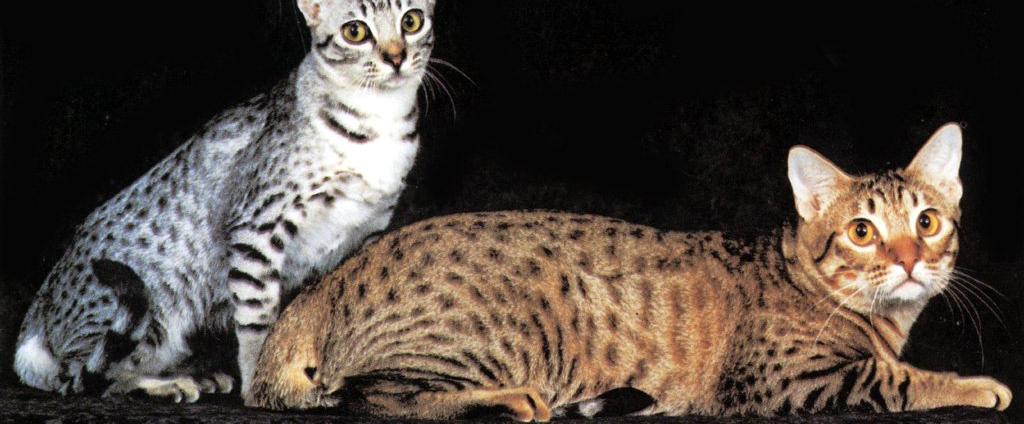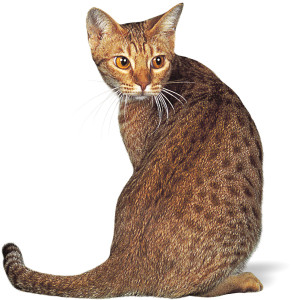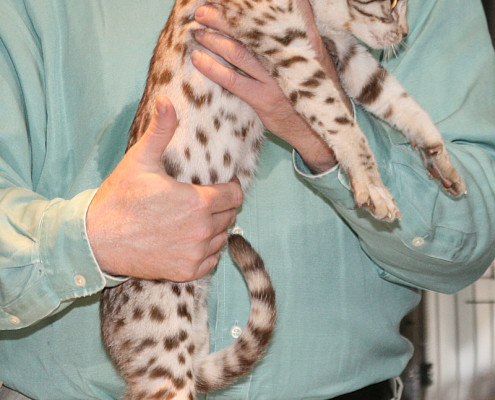Ocicat

Meoww!!
The Ocicat is an all-domestic breed of cat which resembles a wild cat but has no wild DNA in its gene pool.
In 5 Words
- Very outgoing
- Demanding,
- Clinging-vine
- Confident
- Dedicated
Snapshot
Height:9-11 inches
Weight:6-15 pounds
Lifespan:12-14 years
Physique:Medium to large breed
Best suited for:Families with children and other pets. Does not like to be alone.
Temperament:Friendly, sociable, vocal. Very people oriented. Needs lots of attention.
Comparable Breed:Oriental

Characteristics
Learn About the Ocicat
It is named for its resemblance to the ocelot. The breed was established from Siamese and Abyssinian stock; later, American Shorthairs (silver tabbies) were added to the mix and gave the breed their silver color, bone structure and distinct markings. In 1964 the original Ocicat was the unexpected result of an experimental breeding which attempted to produce an Aby-point Siamese.
The Ocicat is a relatively new breed of cat that resulted from an accidental mating in the 1960’s. A seal point Siamese and a Usual Abyssinian were mated in an attempt by Virginia Daly of the Dalai Cattery in America to produce an Abyssinian pointed Siamese. One of the resultant kittens then bred back to a chocolate point Siamese.
Now ranked 18th in popularity among the CFA-recognized breeds, the Ocicat was granted championship status in 1987.
The Ocicat is an all-domestic breed of cat which resembles a wild cat but has no wild DNA in its gene pool. There are twelve colors approved for the ocicat breed. Tawny, chocolate and cinnamon, their dilutes, blue, lavender and fawn, and all of them with silver: black silver (ebony silver), chocolate silver, cinnamon silver, blue silver, lavender silver and fawn silver. The body is solid with substantial bone and muscle. The chest is deep and broad and the back is straight and slightly higher at the rear giving the impression of a wild hunting cat. The legs are powerful and well muscled, of medium length with compact oval paws. The tail is long and shows virtually no tapering from a broad base.
The first kitten was named an Ocicat because of its resemblance to an ocelot. The Ocicat resembles a wild cat, but no wild animal is exploited to produce this beautiful breed.
They are powerful cats that look ready to stalk their prey at any second-their toy mouse, that is! The jungle look with the amenable personality of the domestic, these spotted cats never fail to make an impact with all who meet them.
The breed is unusual in that it is spotted like a wild cat but has the temperament of a domestic animal. Ocicats are said to be a very outgoing breed. They are often considered to have the spirit of a dog in a cat’s body. It is a lot like a dog in that it is absolutely devoted to its people. The Ocicat is not a demanding, clinging-vine type, but is confident as well as dedicated to its owners. Most Ocicats are also quite extroverted around strangers, not at all bashful about checking out the possibilities for a few playmates or a lap to curl up on when visitors come to call.
The mature Ocicat is a large cat with a powerful, sleek semi-foreign body of solid muscle dressed in a short, tight spotted coat. The athletic males weigh between 9 and 14 pounds and the graceful females 6 and 9 pounds. The large almond shaped eyes are angled slightly adding to the cat’s exotic look.
The Ocicat is very adaptable and, if in the interests of safety the garden is to be out of bounds, they will be quite happy with an indoor gymnasium of scratching post and stairs.
Except for gingivitis, they are not prone to any particular health problem and their broad genetic background gives them vigor and vitality.
Their diets are the same as any domestic and their short coats need only the occasional bathing and grooming. The Ocicat does not require excessive grooming because of its short close-lying coat. They will fastidiously wash themselves and keep their coats in good condition but they will enjoy the attention that comes with grooming.
Prone to gingivitis, this breed benefits by having you brush its teeth on a regular basis to prevent tartar buildup.






